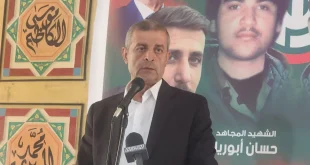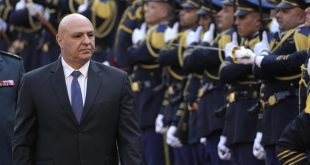إيران تتدخل سراً لعرقلة مفاوضات وقف إطلاق النار في لبنان
كشفت مصادر مطلعة لـ”سكاي نيوز” عن تدخلات إيرانية سرية تهدف إلى عرقلة مفاوضات وقف إطلاق النار في لبنان، حيث تعمل طهران على ضمان مصالحها الاستراتيجية في المنطقة عبر دعم إعادة بناء قدرات حزب الله بعد انتهاء الصراع. وتؤكد هذه المصادر أن الاتصالات الإيرانية تسعى للتأثير على سير المفاوضات بما يتماشى مع أجندتها السياسية والعسكرية.
الدبلوماسية الأميركية في مواجهة التصعيد
على صعيد آخر، يواصل المبعوث الأميركي آموس هوكشتاين جولاته بين بيروت وتل أبيب في محاولة حثيثة لإنهاء التصعيد العسكري الذي يشهده لبنان منذ أواخر سبتمبر الماضي. هذه الجهود تأتي ضمن مساعٍ دولية مكثفة تهدف إلى تحقيق وقف إطلاق النار، حيث تقوم الأطراف اللبنانية حالياً بدراسة المقترح الأميركي الذي يتضمن مسودة اتفاق شاملة لتحقيق الاستقرار في الجنوب اللبناني.
بنود رئيسية في مسودة الاتفاق
تشمل المسودة المقترحة بنوداً تهدف إلى تحقيق توازن بين الأمن والاستقرار في الجنوب اللبناني، من أبرزها:
- التأكيد على الالتزام بالقرار 1701 الصادر عن الأمم المتحدة، لضمان استقرار الأوضاع الحدودية.
- ضمان حق الدفاع عن النفس مع وضع إطار واضح لتنظيم النشاط العسكري في المنطقة.
- إعادة انتشار القوات الإسرائيلية واستبدالها بوحدات من الجيش اللبناني لضمان السيادة الوطنية.
- نزع سلاح الجماعات المسلحة غير الرسمية في الجنوب خلال فترة لا تتجاوز 60 يوماً من توقيع الاتفاق.
أبعاد التدخل الإيراني
تشير التحليلات إلى أن إيران تسعى عبر هذه التدخلات لضمان استمرار نفوذها في لبنان، خاصة من خلال دعم حزب الله كذراع رئيسية لها في المنطقة. هذا التدخل يزيد من تعقيد المفاوضات، حيث يضع العراقيل أمام الجهود الدولية التي تهدف إلى التوصل إلى حل يرضي جميع الأطراف، ويؤمن استقرار الجنوب اللبناني على المدى الطويل.
مستقبل المفاوضات في ظل التدخلات الخارجية
مع استمرار التصعيد العسكري والدبلوماسي، يبدو أن مسار المفاوضات لن يكون سهلاً. التدخلات الإيرانية قد تؤخر التوصل إلى اتفاق، لكنها تسلط الضوء على أهمية الجهود الدولية في مواجهة هذه التحديات. ومع ذلك، يبقى السؤال: هل ستنجح الضغوط الدولية في تحقيق وقف إطلاق النار وسط هذا التشابك الإقليمي؟
المصدر: رصد موقع سكوبات المية
Iran Secretly Intervenes to Derail Ceasefire Negotiations in Lebanon
Sources informed Sky News that Iran is covertly interfering in ongoing ceasefire negotiations in Lebanon, aiming to obstruct progress. The secret maneuvers reportedly focus on ensuring Iran's interests, particularly by securing the possibility of rebuilding Hezbollah’s capabilities post-conflict.
U.S. Mediation Amid Escalation
Meanwhile, U.S. envoy Amos Hochstein continues his shuttle diplomacy between Beirut and Tel Aviv, striving to mediate a ceasefire agreement that could end the hostilities persisting since late September. Lebanese officials are carefully examining the U.S. proposal, which outlines a framework to stabilize the southern region.
Key Provisions of the Draft Agreement
The draft agreement includes several pivotal elements designed to maintain security and stability in southern Lebanon, such as:
- Commitment to U.N. Resolution 1701, emphasizing border stability.
- Ensuring self-defense rights with regulated military activity in the region.
- Israeli withdrawal to be replaced by the deployment of Lebanese Armed Forces in southern territories.
- Disarmament of non-official armed groups in the south within 60 days of signing the agreement.
Implications of Iran’s Involvement
Analysts suggest that Iran’s intervention is aimed at safeguarding its strategic foothold in Lebanon, particularly through Hezbollah’s operational capabilities. This interference complicates the negotiation process, potentially delaying international efforts to reach a fair and lasting ceasefire agreement.
The Future of Ceasefire Talks
Given the intertwined regional dynamics, achieving a comprehensive ceasefire remains a challenging endeavor. Iran’s covert actions underscore the intricate geopolitical stakes, while international mediators face the uphill task of reconciling conflicting interests to pave the way for lasting peace in Lebanon.
Translated by international scopes team
 International Scopes – سكوبات عالمية إجعل موقعنا خيارك ومصدرك الأنسب للأخبار المحلية والعربية والعالمية على أنواعها بالإضافة الى نشر مجموعة لا بأس بها من الوظائف الشاغرة في لبنان والشرق الأوسط والعالم
International Scopes – سكوبات عالمية إجعل موقعنا خيارك ومصدرك الأنسب للأخبار المحلية والعربية والعالمية على أنواعها بالإضافة الى نشر مجموعة لا بأس بها من الوظائف الشاغرة في لبنان والشرق الأوسط والعالم




